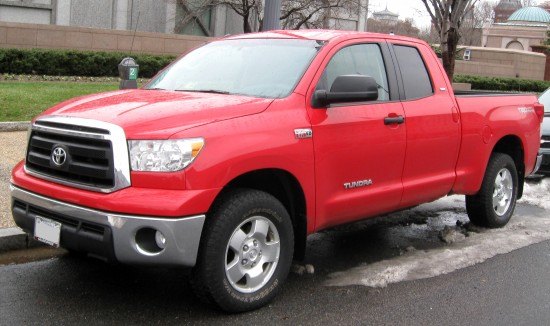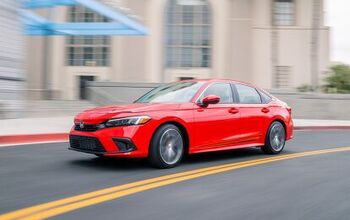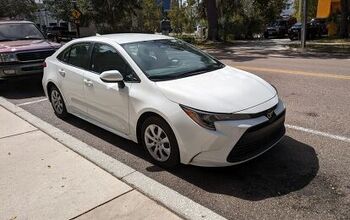California Congressman Alleges CAFE Benefits Bailout Recipients
Bloomberg is reporting that House Republicans, led by California Congressman Darrell Issa, are set to produce a report that heavily criticizes CAFE as a politicized move designed to curry favor with bailed out auto makers and environmental groups.
Issa called CAFE
Singled out in particular by Issa were the influence exerted by California (which can write its own rules if it is unsatisfied with the federal government’s own rules) and environmental groups. The Detroit News reports that Toyota, along with other foreign automakers, were unhappy with the deal, and they perceived favoritism towards the home team.
Automotive News, quoting the paper, recounts how Toyota Motor Sales U.S. head Jim Lentz told Ron Bloom, then the White House chief negotiator, how Toyota felt.
Another sticking point for Toyota was the slippery definition of what exactly constitutes a truck. The Big Three had been using this as a way to shift vehicles, like the Chrysler PT Cruiser, into the “truck” column to help bring down their fuel economy averages on the truck side.
Toyota also argued that the definition of a full-sized pickup truck — a stronghold of Detroit automakers for years — had been written to exclude the Toyota Tundra. Lentz said the deal was an “old Detroit tactic. It may hurt me, but it hurts my competitors more,” Toyota’s notes said, the News reported. But the White House was eager for Toyota to support the deal. “It looks bad for me and bad for you if Toyota is not there,” Bloom told Lentz at one point during the process, the News reported.
More by Derek Kreindler
Latest Car Reviews
Read moreLatest Product Reviews
Read moreRecent Comments
- MaintenanceCosts Nobody here seems to acknowledge that there are multiple use cases for cars.Some people spend all their time driving all over the country and need every mile and minute of time savings. ICE cars are better for them right now.Some people only drive locally and fly when they travel. For them, there's probably a range number that works, and they don't really need more. For the uses for which we use our EV, that would be around 150 miles. The other thing about a low range requirement is it can make 120V charging viable. If you don't drive more than an average of about 40 miles/day, you can probably get enough electrons through a wall outlet. We spent over two years charging our Bolt only through 120V, while our house was getting rebuilt, and never had an issue.Those are extremes. There are all sorts of use cases in between, which probably represent the majority of drivers. For some users, what's needed is more range. But I think for most users, what's needed is better charging. Retrofit apartment garages like Tim's with 240V outlets at every spot. Install more L3 chargers in supermarket parking lots and alongside gas stations. Make chargers that work like Tesla Superchargers as ubiquitous as gas stations, and EV charging will not be an issue for most users.
- MaintenanceCosts I don't have an opinion on whether any one plant unionizing is the right answer, but the employees sure need to have the right to organize. Unions or the credible threat of unionization are the only thing, history has proven, that can keep employers honest. Without it, we've seen over and over, the employers have complete power over the workers and feel free to exploit the workers however they see fit. (And don't tell me "oh, the workers can just leave" - in an oligopolistic industry, working conditions quickly converge, and there's not another employer right around the corner.)
- Kjhkjlhkjhkljh kljhjkhjklhkjh [h3]Wake me up when it is a 1989 635Csi with a M88/3[/h3]
- BrandX "I can charge using the 240V outlets, sure, but it’s slow."No it's not. That's what all home chargers use - 240V.
- Jalop1991 does the odometer represent itself in an analog fashion? Will the numbers roll slowly and stop wherever, or do they just blink to the next number like any old boring modern car?































Comments
Join the conversation
It's not running out, it's cost of current supply (20 years ago 3/5th's of the world's population was riding bikes (India and China)or public transit, (the soviet block countries weren't known for mass-car ownership, but SU was 2nd or 3rd largest exporter of Oil at the time)), those 3 billion people are driving or want to drive soon. Oil was around $10/barrel in 1991, this was saudi crude, easiest to get at in the world (What is $/barrel now during a world recession?). So that leads to next part of problem, cost of future demand as population continues to increase at rate that earth can't sustain (China's one child was more than compensated by India's 9 or 10 child policy) and this population boom is taking place in east asia, not some rat holes (sorry for use of term, but genocide only seems to matter to the world when it takes place in europe or a country with resources we was) in africa, these people can and will buy cars.
Pretty funny that a right-wing Republican is siding with Toyota and complaining about CAFE standards not going far enough for light-trucks. Also pretty funny about Toyota complainging about domestic "homerism." The domestics have to meet the same CAFE standards as Toyota when it comes to cars and light trucks; it's not their fault if Toyota doesn't sell as many light trucks.